NUR 572: Education and Learning Issues in Nursing Curriculum Analysis
VerifiedAdded on 2022/09/18
|6
|1642
|33
Report
AI Summary
This report, written from the perspective of a Nurse Leader in Saudi Arabia, addresses critical issues within the country's nursing education system. It begins by defining the core problem: the impact of inadequate nursing education on healthcare quality. The report delves into the history of nursing education in Saudi Arabia, highlighting its evolution since 1954 and the persistent challenges faced by nurses. A comprehensive critique and analysis section evaluates both the positive and negative aspects of the current situation, including staff shortages, cultural diversity issues, and the reliance on traditional teaching methods. The report contrasts Saudi Arabia's approach with more advanced systems in countries like the United States and China, offering examples of innovative curriculum designs. Finally, the report provides specific recommendations for improvement, such as adopting transformative learning methods, integrating technology, promoting professional certification, and implementing a national core curriculum to ensure consistency and enhance the overall quality of nursing practice across the country. The report is designed to provide insights to be raised to the Minister of Education and Minister of Health.
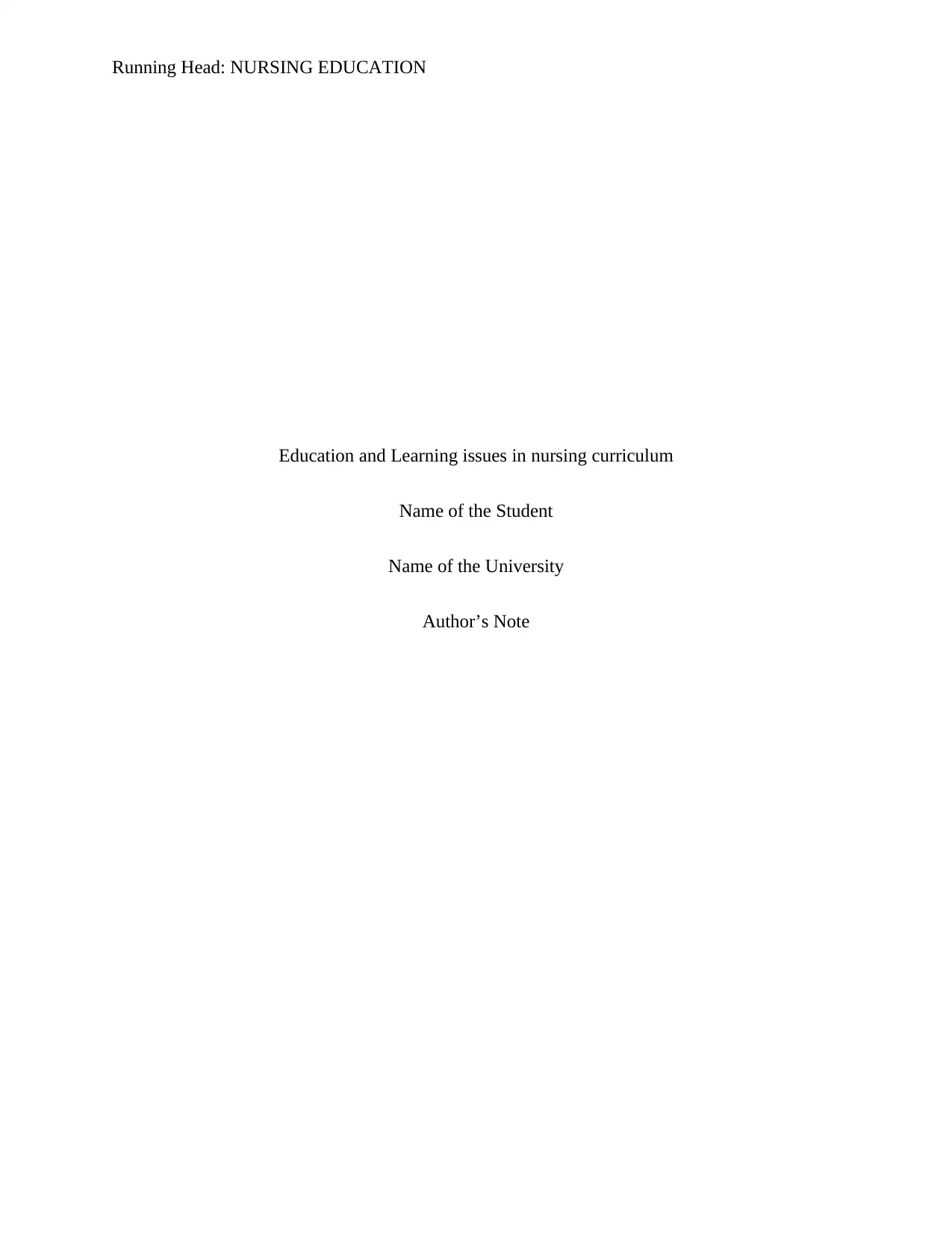
Running Head: NURSING EDUCATION
Education and Learning issues in nursing curriculum
Name of the Student
Name of the University
Author’s Note
Education and Learning issues in nursing curriculum
Name of the Student
Name of the University
Author’s Note
Paraphrase This Document
Need a fresh take? Get an instant paraphrase of this document with our AI Paraphraser
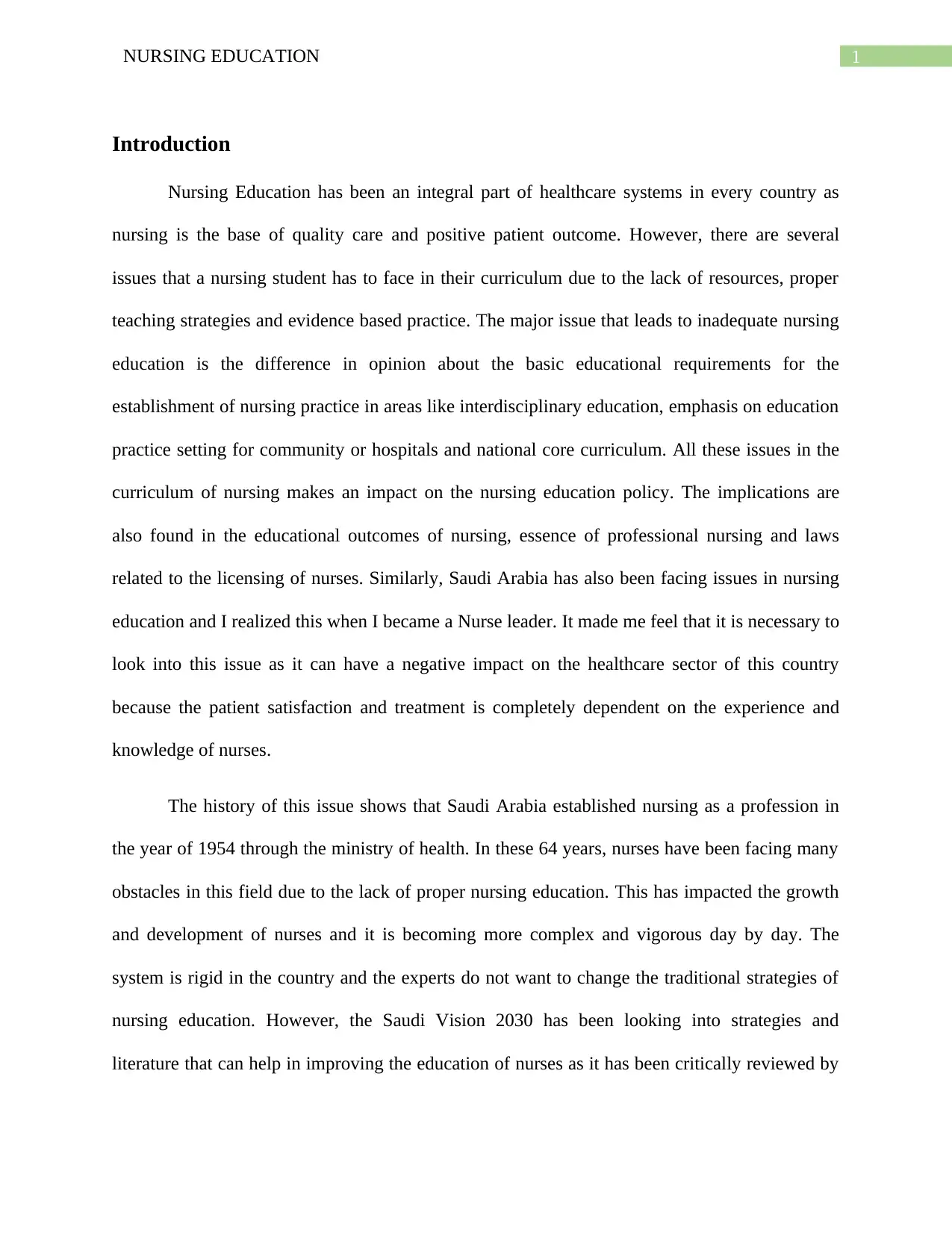
1NURSING EDUCATION
Introduction
Nursing Education has been an integral part of healthcare systems in every country as
nursing is the base of quality care and positive patient outcome. However, there are several
issues that a nursing student has to face in their curriculum due to the lack of resources, proper
teaching strategies and evidence based practice. The major issue that leads to inadequate nursing
education is the difference in opinion about the basic educational requirements for the
establishment of nursing practice in areas like interdisciplinary education, emphasis on education
practice setting for community or hospitals and national core curriculum. All these issues in the
curriculum of nursing makes an impact on the nursing education policy. The implications are
also found in the educational outcomes of nursing, essence of professional nursing and laws
related to the licensing of nurses. Similarly, Saudi Arabia has also been facing issues in nursing
education and I realized this when I became a Nurse leader. It made me feel that it is necessary to
look into this issue as it can have a negative impact on the healthcare sector of this country
because the patient satisfaction and treatment is completely dependent on the experience and
knowledge of nurses.
The history of this issue shows that Saudi Arabia established nursing as a profession in
the year of 1954 through the ministry of health. In these 64 years, nurses have been facing many
obstacles in this field due to the lack of proper nursing education. This has impacted the growth
and development of nurses and it is becoming more complex and vigorous day by day. The
system is rigid in the country and the experts do not want to change the traditional strategies of
nursing education. However, the Saudi Vision 2030 has been looking into strategies and
literature that can help in improving the education of nurses as it has been critically reviewed by
Introduction
Nursing Education has been an integral part of healthcare systems in every country as
nursing is the base of quality care and positive patient outcome. However, there are several
issues that a nursing student has to face in their curriculum due to the lack of resources, proper
teaching strategies and evidence based practice. The major issue that leads to inadequate nursing
education is the difference in opinion about the basic educational requirements for the
establishment of nursing practice in areas like interdisciplinary education, emphasis on education
practice setting for community or hospitals and national core curriculum. All these issues in the
curriculum of nursing makes an impact on the nursing education policy. The implications are
also found in the educational outcomes of nursing, essence of professional nursing and laws
related to the licensing of nurses. Similarly, Saudi Arabia has also been facing issues in nursing
education and I realized this when I became a Nurse leader. It made me feel that it is necessary to
look into this issue as it can have a negative impact on the healthcare sector of this country
because the patient satisfaction and treatment is completely dependent on the experience and
knowledge of nurses.
The history of this issue shows that Saudi Arabia established nursing as a profession in
the year of 1954 through the ministry of health. In these 64 years, nurses have been facing many
obstacles in this field due to the lack of proper nursing education. This has impacted the growth
and development of nurses and it is becoming more complex and vigorous day by day. The
system is rigid in the country and the experts do not want to change the traditional strategies of
nursing education. However, the Saudi Vision 2030 has been looking into strategies and
literature that can help in improving the education of nurses as it has been critically reviewed by
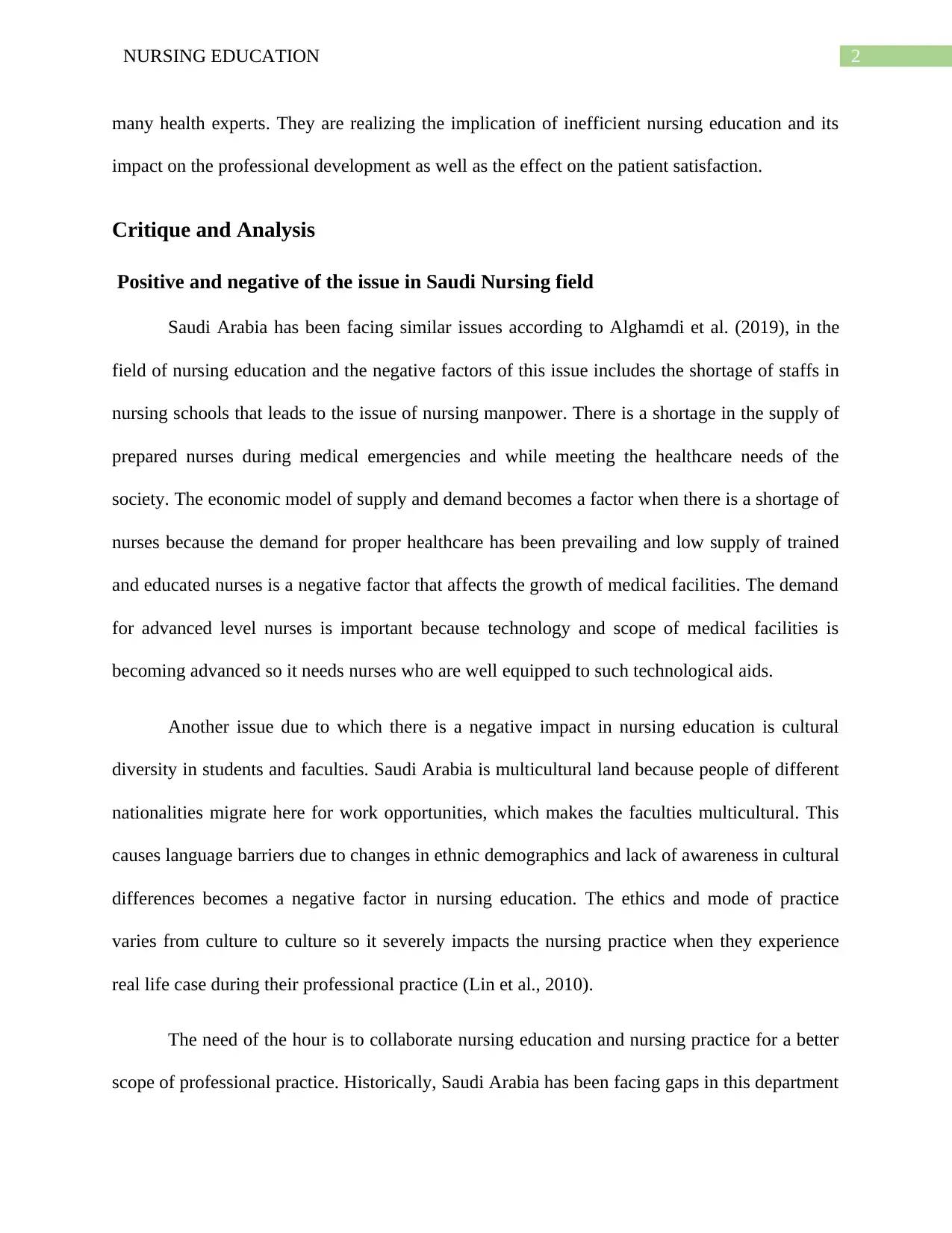
2NURSING EDUCATION
many health experts. They are realizing the implication of inefficient nursing education and its
impact on the professional development as well as the effect on the patient satisfaction.
Critique and Analysis
Positive and negative of the issue in Saudi Nursing field
Saudi Arabia has been facing similar issues according to Alghamdi et al. (2019), in the
field of nursing education and the negative factors of this issue includes the shortage of staffs in
nursing schools that leads to the issue of nursing manpower. There is a shortage in the supply of
prepared nurses during medical emergencies and while meeting the healthcare needs of the
society. The economic model of supply and demand becomes a factor when there is a shortage of
nurses because the demand for proper healthcare has been prevailing and low supply of trained
and educated nurses is a negative factor that affects the growth of medical facilities. The demand
for advanced level nurses is important because technology and scope of medical facilities is
becoming advanced so it needs nurses who are well equipped to such technological aids.
Another issue due to which there is a negative impact in nursing education is cultural
diversity in students and faculties. Saudi Arabia is multicultural land because people of different
nationalities migrate here for work opportunities, which makes the faculties multicultural. This
causes language barriers due to changes in ethnic demographics and lack of awareness in cultural
differences becomes a negative factor in nursing education. The ethics and mode of practice
varies from culture to culture so it severely impacts the nursing practice when they experience
real life case during their professional practice (Lin et al., 2010).
The need of the hour is to collaborate nursing education and nursing practice for a better
scope of professional practice. Historically, Saudi Arabia has been facing gaps in this department
many health experts. They are realizing the implication of inefficient nursing education and its
impact on the professional development as well as the effect on the patient satisfaction.
Critique and Analysis
Positive and negative of the issue in Saudi Nursing field
Saudi Arabia has been facing similar issues according to Alghamdi et al. (2019), in the
field of nursing education and the negative factors of this issue includes the shortage of staffs in
nursing schools that leads to the issue of nursing manpower. There is a shortage in the supply of
prepared nurses during medical emergencies and while meeting the healthcare needs of the
society. The economic model of supply and demand becomes a factor when there is a shortage of
nurses because the demand for proper healthcare has been prevailing and low supply of trained
and educated nurses is a negative factor that affects the growth of medical facilities. The demand
for advanced level nurses is important because technology and scope of medical facilities is
becoming advanced so it needs nurses who are well equipped to such technological aids.
Another issue due to which there is a negative impact in nursing education is cultural
diversity in students and faculties. Saudi Arabia is multicultural land because people of different
nationalities migrate here for work opportunities, which makes the faculties multicultural. This
causes language barriers due to changes in ethnic demographics and lack of awareness in cultural
differences becomes a negative factor in nursing education. The ethics and mode of practice
varies from culture to culture so it severely impacts the nursing practice when they experience
real life case during their professional practice (Lin et al., 2010).
The need of the hour is to collaborate nursing education and nursing practice for a better
scope of professional practice. Historically, Saudi Arabia has been facing gaps in this department
⊘ This is a preview!⊘
Do you want full access?
Subscribe today to unlock all pages.

Trusted by 1+ million students worldwide
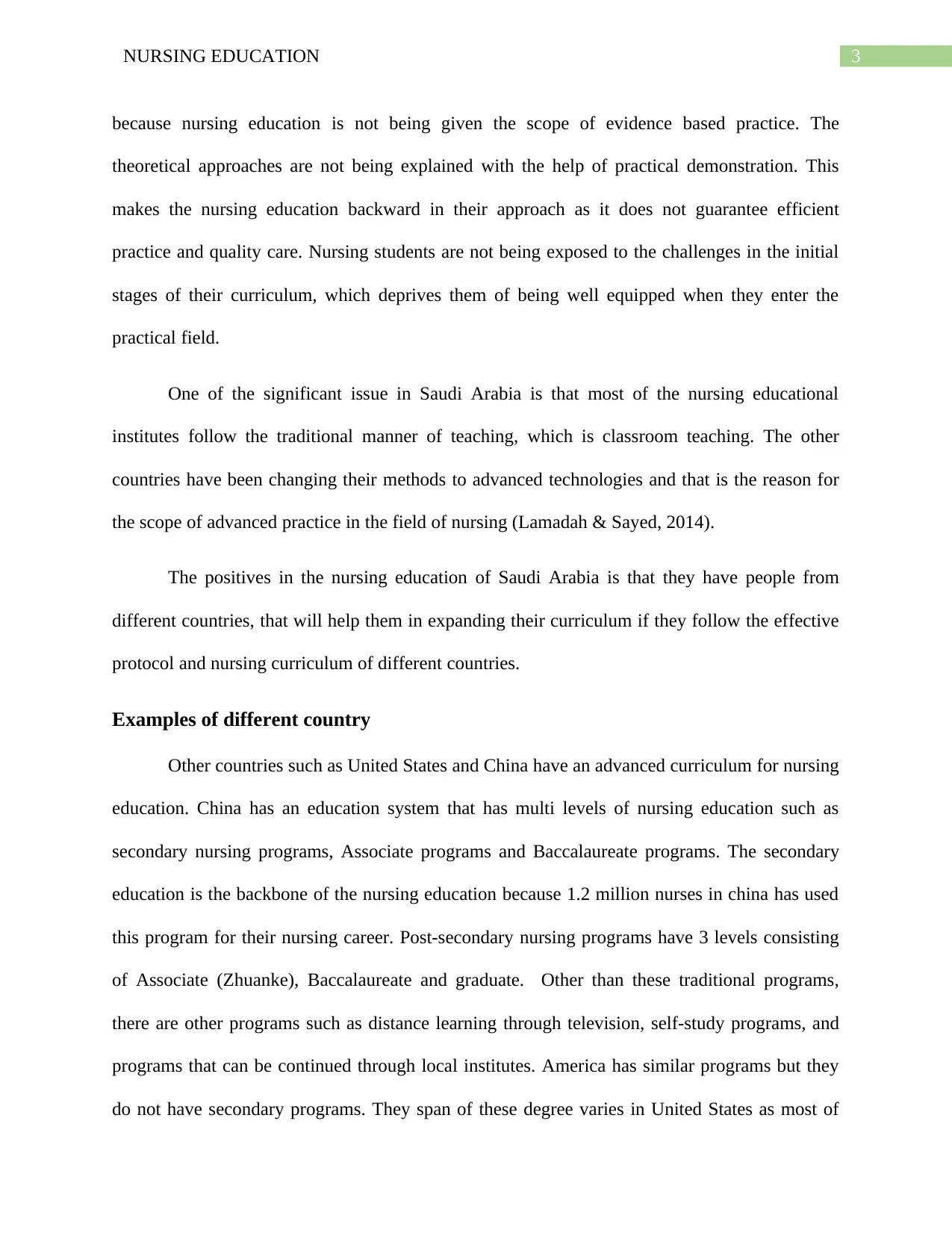
3NURSING EDUCATION
because nursing education is not being given the scope of evidence based practice. The
theoretical approaches are not being explained with the help of practical demonstration. This
makes the nursing education backward in their approach as it does not guarantee efficient
practice and quality care. Nursing students are not being exposed to the challenges in the initial
stages of their curriculum, which deprives them of being well equipped when they enter the
practical field.
One of the significant issue in Saudi Arabia is that most of the nursing educational
institutes follow the traditional manner of teaching, which is classroom teaching. The other
countries have been changing their methods to advanced technologies and that is the reason for
the scope of advanced practice in the field of nursing (Lamadah & Sayed, 2014).
The positives in the nursing education of Saudi Arabia is that they have people from
different countries, that will help them in expanding their curriculum if they follow the effective
protocol and nursing curriculum of different countries.
Examples of different country
Other countries such as United States and China have an advanced curriculum for nursing
education. China has an education system that has multi levels of nursing education such as
secondary nursing programs, Associate programs and Baccalaureate programs. The secondary
education is the backbone of the nursing education because 1.2 million nurses in china has used
this program for their nursing career. Post-secondary nursing programs have 3 levels consisting
of Associate (Zhuanke), Baccalaureate and graduate. Other than these traditional programs,
there are other programs such as distance learning through television, self-study programs, and
programs that can be continued through local institutes. America has similar programs but they
do not have secondary programs. They span of these degree varies in United States as most of
because nursing education is not being given the scope of evidence based practice. The
theoretical approaches are not being explained with the help of practical demonstration. This
makes the nursing education backward in their approach as it does not guarantee efficient
practice and quality care. Nursing students are not being exposed to the challenges in the initial
stages of their curriculum, which deprives them of being well equipped when they enter the
practical field.
One of the significant issue in Saudi Arabia is that most of the nursing educational
institutes follow the traditional manner of teaching, which is classroom teaching. The other
countries have been changing their methods to advanced technologies and that is the reason for
the scope of advanced practice in the field of nursing (Lamadah & Sayed, 2014).
The positives in the nursing education of Saudi Arabia is that they have people from
different countries, that will help them in expanding their curriculum if they follow the effective
protocol and nursing curriculum of different countries.
Examples of different country
Other countries such as United States and China have an advanced curriculum for nursing
education. China has an education system that has multi levels of nursing education such as
secondary nursing programs, Associate programs and Baccalaureate programs. The secondary
education is the backbone of the nursing education because 1.2 million nurses in china has used
this program for their nursing career. Post-secondary nursing programs have 3 levels consisting
of Associate (Zhuanke), Baccalaureate and graduate. Other than these traditional programs,
there are other programs such as distance learning through television, self-study programs, and
programs that can be continued through local institutes. America has similar programs but they
do not have secondary programs. They span of these degree varies in United States as most of
Paraphrase This Document
Need a fresh take? Get an instant paraphrase of this document with our AI Paraphraser
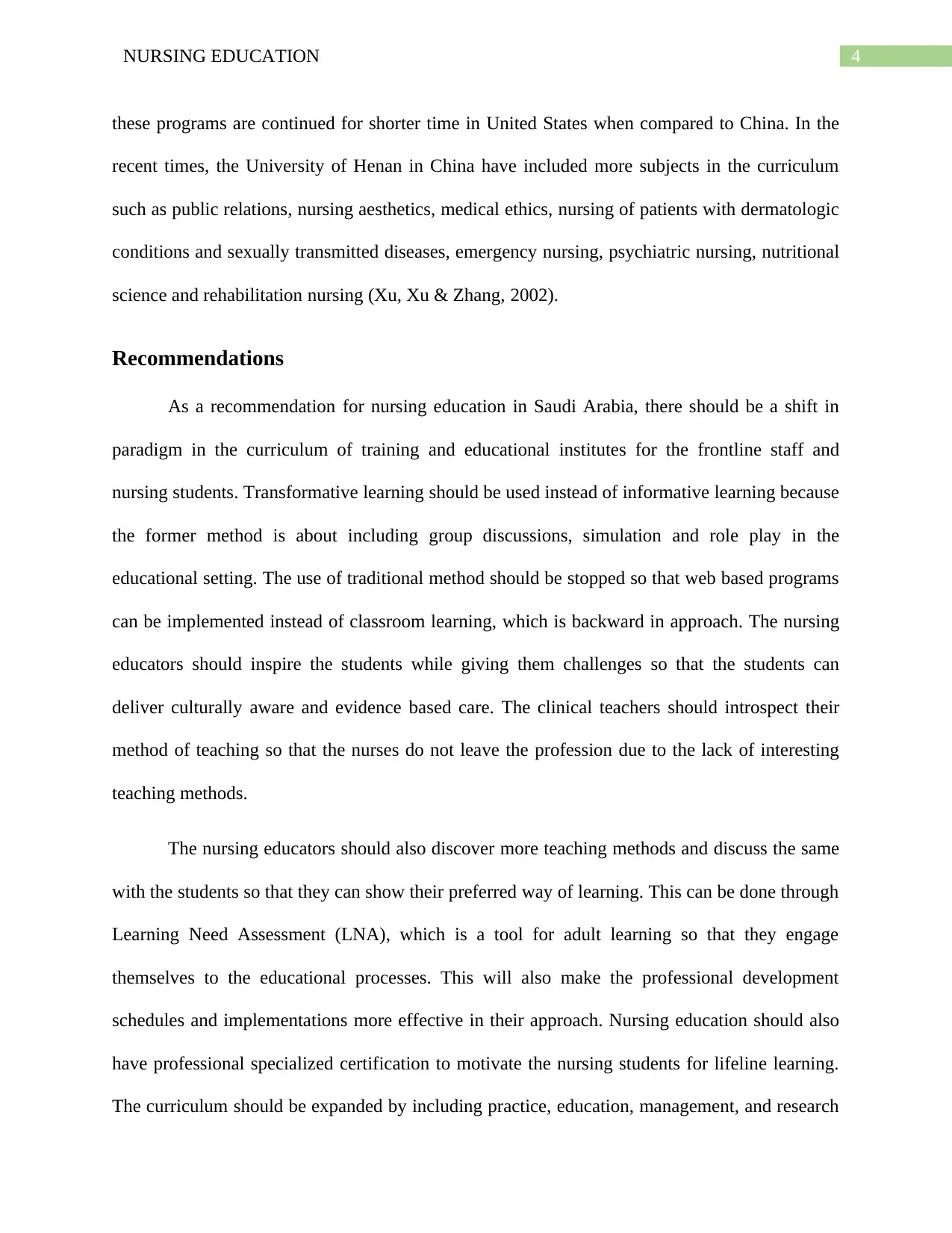
4NURSING EDUCATION
these programs are continued for shorter time in United States when compared to China. In the
recent times, the University of Henan in China have included more subjects in the curriculum
such as public relations, nursing aesthetics, medical ethics, nursing of patients with dermatologic
conditions and sexually transmitted diseases, emergency nursing, psychiatric nursing, nutritional
science and rehabilitation nursing (Xu, Xu & Zhang, 2002).
Recommendations
As a recommendation for nursing education in Saudi Arabia, there should be a shift in
paradigm in the curriculum of training and educational institutes for the frontline staff and
nursing students. Transformative learning should be used instead of informative learning because
the former method is about including group discussions, simulation and role play in the
educational setting. The use of traditional method should be stopped so that web based programs
can be implemented instead of classroom learning, which is backward in approach. The nursing
educators should inspire the students while giving them challenges so that the students can
deliver culturally aware and evidence based care. The clinical teachers should introspect their
method of teaching so that the nurses do not leave the profession due to the lack of interesting
teaching methods.
The nursing educators should also discover more teaching methods and discuss the same
with the students so that they can show their preferred way of learning. This can be done through
Learning Need Assessment (LNA), which is a tool for adult learning so that they engage
themselves to the educational processes. This will also make the professional development
schedules and implementations more effective in their approach. Nursing education should also
have professional specialized certification to motivate the nursing students for lifeline learning.
The curriculum should be expanded by including practice, education, management, and research
these programs are continued for shorter time in United States when compared to China. In the
recent times, the University of Henan in China have included more subjects in the curriculum
such as public relations, nursing aesthetics, medical ethics, nursing of patients with dermatologic
conditions and sexually transmitted diseases, emergency nursing, psychiatric nursing, nutritional
science and rehabilitation nursing (Xu, Xu & Zhang, 2002).
Recommendations
As a recommendation for nursing education in Saudi Arabia, there should be a shift in
paradigm in the curriculum of training and educational institutes for the frontline staff and
nursing students. Transformative learning should be used instead of informative learning because
the former method is about including group discussions, simulation and role play in the
educational setting. The use of traditional method should be stopped so that web based programs
can be implemented instead of classroom learning, which is backward in approach. The nursing
educators should inspire the students while giving them challenges so that the students can
deliver culturally aware and evidence based care. The clinical teachers should introspect their
method of teaching so that the nurses do not leave the profession due to the lack of interesting
teaching methods.
The nursing educators should also discover more teaching methods and discuss the same
with the students so that they can show their preferred way of learning. This can be done through
Learning Need Assessment (LNA), which is a tool for adult learning so that they engage
themselves to the educational processes. This will also make the professional development
schedules and implementations more effective in their approach. Nursing education should also
have professional specialized certification to motivate the nursing students for lifeline learning.
The curriculum should be expanded by including practice, education, management, and research
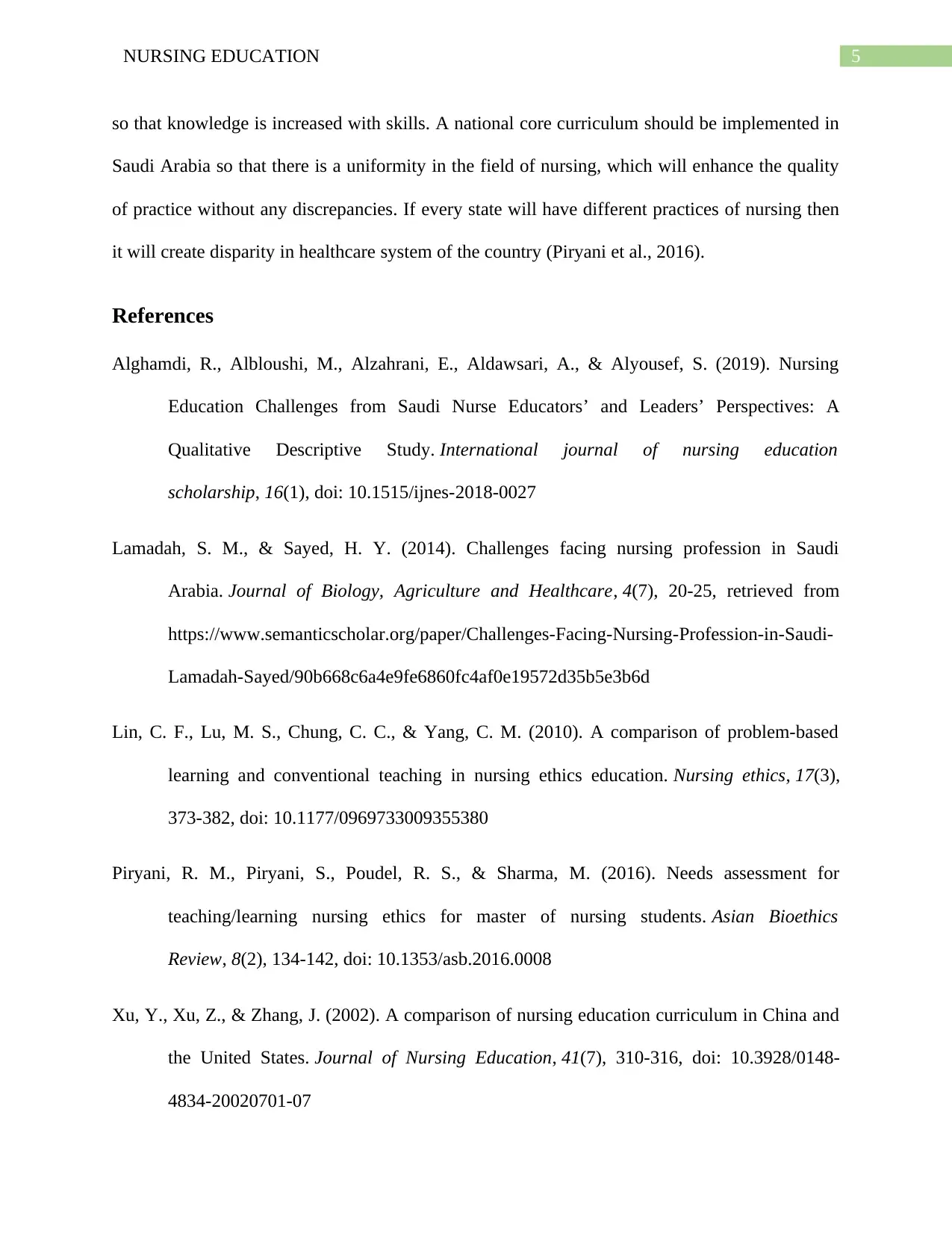
5NURSING EDUCATION
so that knowledge is increased with skills. A national core curriculum should be implemented in
Saudi Arabia so that there is a uniformity in the field of nursing, which will enhance the quality
of practice without any discrepancies. If every state will have different practices of nursing then
it will create disparity in healthcare system of the country (Piryani et al., 2016).
References
Alghamdi, R., Albloushi, M., Alzahrani, E., Aldawsari, A., & Alyousef, S. (2019). Nursing
Education Challenges from Saudi Nurse Educators’ and Leaders’ Perspectives: A
Qualitative Descriptive Study. International journal of nursing education
scholarship, 16(1), doi: 10.1515/ijnes-2018-0027
Lamadah, S. M., & Sayed, H. Y. (2014). Challenges facing nursing profession in Saudi
Arabia. Journal of Biology, Agriculture and Healthcare, 4(7), 20-25, retrieved from
https://www.semanticscholar.org/paper/Challenges-Facing-Nursing-Profession-in-Saudi-
Lamadah-Sayed/90b668c6a4e9fe6860fc4af0e19572d35b5e3b6d
Lin, C. F., Lu, M. S., Chung, C. C., & Yang, C. M. (2010). A comparison of problem-based
learning and conventional teaching in nursing ethics education. Nursing ethics, 17(3),
373-382, doi: 10.1177/0969733009355380
Piryani, R. M., Piryani, S., Poudel, R. S., & Sharma, M. (2016). Needs assessment for
teaching/learning nursing ethics for master of nursing students. Asian Bioethics
Review, 8(2), 134-142, doi: 10.1353/asb.2016.0008
Xu, Y., Xu, Z., & Zhang, J. (2002). A comparison of nursing education curriculum in China and
the United States. Journal of Nursing Education, 41(7), 310-316, doi: 10.3928/0148-
4834-20020701-07
so that knowledge is increased with skills. A national core curriculum should be implemented in
Saudi Arabia so that there is a uniformity in the field of nursing, which will enhance the quality
of practice without any discrepancies. If every state will have different practices of nursing then
it will create disparity in healthcare system of the country (Piryani et al., 2016).
References
Alghamdi, R., Albloushi, M., Alzahrani, E., Aldawsari, A., & Alyousef, S. (2019). Nursing
Education Challenges from Saudi Nurse Educators’ and Leaders’ Perspectives: A
Qualitative Descriptive Study. International journal of nursing education
scholarship, 16(1), doi: 10.1515/ijnes-2018-0027
Lamadah, S. M., & Sayed, H. Y. (2014). Challenges facing nursing profession in Saudi
Arabia. Journal of Biology, Agriculture and Healthcare, 4(7), 20-25, retrieved from
https://www.semanticscholar.org/paper/Challenges-Facing-Nursing-Profession-in-Saudi-
Lamadah-Sayed/90b668c6a4e9fe6860fc4af0e19572d35b5e3b6d
Lin, C. F., Lu, M. S., Chung, C. C., & Yang, C. M. (2010). A comparison of problem-based
learning and conventional teaching in nursing ethics education. Nursing ethics, 17(3),
373-382, doi: 10.1177/0969733009355380
Piryani, R. M., Piryani, S., Poudel, R. S., & Sharma, M. (2016). Needs assessment for
teaching/learning nursing ethics for master of nursing students. Asian Bioethics
Review, 8(2), 134-142, doi: 10.1353/asb.2016.0008
Xu, Y., Xu, Z., & Zhang, J. (2002). A comparison of nursing education curriculum in China and
the United States. Journal of Nursing Education, 41(7), 310-316, doi: 10.3928/0148-
4834-20020701-07
⊘ This is a preview!⊘
Do you want full access?
Subscribe today to unlock all pages.

Trusted by 1+ million students worldwide
1 out of 6
Related Documents
Your All-in-One AI-Powered Toolkit for Academic Success.
+13062052269
info@desklib.com
Available 24*7 on WhatsApp / Email
![[object Object]](/_next/static/media/star-bottom.7253800d.svg)
Unlock your academic potential
Copyright © 2020–2026 A2Z Services. All Rights Reserved. Developed and managed by ZUCOL.





